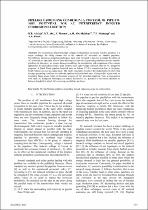 ResearchSpace
ResearchSpace
Pipeline grounding condition: A control of pipe-to-soil potential for AC interference induced corrosion reduction
JavaScript is disabled for your browser. Some features of this site may not work without it.
- ResearchSpace
- →
- Research Publications/Outputs
- →
- Conference Publications
- →
- View Item
| dc.contributor.author |
Adedeji, KB

|
|
| dc.contributor.author |
Abe, BT

|
|
| dc.contributor.author |
Hamam, Y

|
|
| dc.contributor.author |
Abu-Mahfouz, Adnan MI

|
|
| dc.contributor.author |
Shabangu, TH

|
|
| dc.contributor.author |
Jimoh, AA

|
|
| dc.date.accessioned | 2018-03-27T08:59:37Z | |
| dc.date.available | 2018-03-27T08:59:37Z | |
| dc.date.issued | 2017-02 | |
| dc.identifier.citation | Adedeji, K.B. et al. 2017. Pipeline grounding condition: A control of pipe-to-soil potential for AC interference induced corrosion reduction. The 25th Southern African Universities Power Engineering Conference (SAUPEC), Stellenbosch, South Africa, 30 January - 1 February 2017, pp. 577-582 | en_US |
| dc.identifier.isbn | 978-0-620-74503-1 | |
| dc.identifier.uri | http://www0.sun.ac.za/saupec2017/Proceedings/ProceedingView.php?%20ProceedingID%20=%2025 | |
| dc.identifier.uri | http://www0.sun.ac.za/saupec2017/Papers/PaperView.php?%20PublicationID%20=%201740 | |
| dc.identifier.uri | http://hdl.handle.net/10204/10144 | |
| dc.description | Paper presented at the 25th Southern African Universities Power Engineering Conference (SAUPEC), Stellenbosch, South Africa, 30 January - 1 February 2017 | en_US |
| dc.description.abstract | The interference effect from high voltage overhead lines on nearby metallic pipelines is a major challenge for utility owners due to the induced AC potentials on metallic pipelines. Nevertheless, numerous mitigation techniques have been proposed in the past to curtail the effect of AC potentials on pipelines. One of these techniques is the use of grounding conditions for the metallic pipelines. In this paper, we present through modelling, the computation and comparison of the various approaches for grounding metallic pipe installed near high voltage overhead lines for AC mitigation purposes. A Rand Water pipeline installed near an Eskom 275 kV transmission line at Strydpan, South Africa was used as a case study. The model simulation results of the studied network show that the pipe grounding condition in which the pipeline isolated at both ends of the parallel region with an insulating flange gives better performance in terms of AC potential reduction. This, in conjunction with other AC mitigation techniques can reduce the level of AC potential to the barest minimum or below a threshold in which AC corrosion possibilities are lower. | en_US |
| dc.language.iso | en | en_US |
| dc.publisher | SAUPEC | en_US |
| dc.relation.ispartofseries | Worklist;20378 | |
| dc.subject | AC interference | en_US |
| dc.subject | Grounding | en_US |
| dc.subject | Mutual impedance | en_US |
| dc.subject | Pipeline | en_US |
| dc.subject | Pipe-to-soil potential | en_US |
| dc.title | Pipeline grounding condition: A control of pipe-to-soil potential for AC interference induced corrosion reduction | en_US |
| dc.type | Conference Presentation | en_US |
| dc.identifier.apacitation | Adedeji, K., Abe, B., Hamam, Y., Abu-Mahfouz, A. M., Shabangu, T., & Jimoh, A. (2017). Pipeline grounding condition: A control of pipe-to-soil potential for AC interference induced corrosion reduction. SAUPEC. http://hdl.handle.net/10204/10144 | en_ZA |
| dc.identifier.chicagocitation | Adedeji, KB, BT Abe, Y Hamam, Adnan MI Abu-Mahfouz, TH Shabangu, and AA Jimoh. "Pipeline grounding condition: A control of pipe-to-soil potential for AC interference induced corrosion reduction." (2017): http://hdl.handle.net/10204/10144 | en_ZA |
| dc.identifier.vancouvercitation | Adedeji K, Abe B, Hamam Y, Abu-Mahfouz AM, Shabangu T, Jimoh A, Pipeline grounding condition: A control of pipe-to-soil potential for AC interference induced corrosion reduction; SAUPEC; 2017. http://hdl.handle.net/10204/10144 . | en_ZA |
| dc.identifier.ris | TY - Conference Presentation AU - Adedeji, KB AU - Abe, BT AU - Hamam, Y AU - Abu-Mahfouz, Adnan MI AU - Shabangu, TH AU - Jimoh, AA AB - The interference effect from high voltage overhead lines on nearby metallic pipelines is a major challenge for utility owners due to the induced AC potentials on metallic pipelines. Nevertheless, numerous mitigation techniques have been proposed in the past to curtail the effect of AC potentials on pipelines. One of these techniques is the use of grounding conditions for the metallic pipelines. In this paper, we present through modelling, the computation and comparison of the various approaches for grounding metallic pipe installed near high voltage overhead lines for AC mitigation purposes. A Rand Water pipeline installed near an Eskom 275 kV transmission line at Strydpan, South Africa was used as a case study. The model simulation results of the studied network show that the pipe grounding condition in which the pipeline isolated at both ends of the parallel region with an insulating flange gives better performance in terms of AC potential reduction. This, in conjunction with other AC mitigation techniques can reduce the level of AC potential to the barest minimum or below a threshold in which AC corrosion possibilities are lower. DA - 2017-02 DB - ResearchSpace DP - CSIR KW - AC interference KW - Grounding KW - Mutual impedance KW - Pipeline KW - Pipe-to-soil potential LK - https://researchspace.csir.co.za PY - 2017 SM - 978-0-620-74503-1 T1 - Pipeline grounding condition: A control of pipe-to-soil potential for AC interference induced corrosion reduction TI - Pipeline grounding condition: A control of pipe-to-soil potential for AC interference induced corrosion reduction UR - http://hdl.handle.net/10204/10144 ER - | en_ZA |





